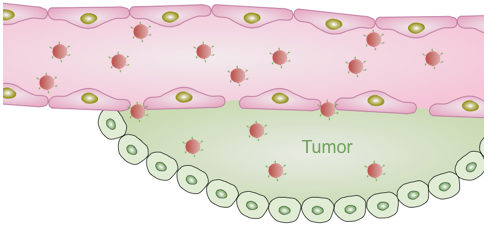The Henry Samueli School of Engineering | UC Irvine
Targeting cancer
Targeting cancer
Molecular targeting of tumors is of intense interest because it could enable earlier detection of nascent tumors when they are much more easy to treat. However, delivery is complicated by the need for agents to transport out of the vasculature and into the tumor environment. The “leaky” nature of vessels and poor lymphatic drainage of tumors can be exploited to deliver macromolecules and nanoparticles by means of the enhanced permeability and retention effect (EPR). However, the EPR effect significantly limits the benefits of molecular targeting. We are working to create nanomaterial contrast agents that can be activated by interacting with molecular targets inside of tumors. In this manner, nanoparticles that are present within the tumor due to the EPR effect will be silent, and signal will only eminate if the molecular target is present. These agents are similar to the activatable nanomaterials described in the molecular probes section, but deploying them in vivo will require that agents be biocompatible, evade clearance, and have precise control over tumor targeting.
